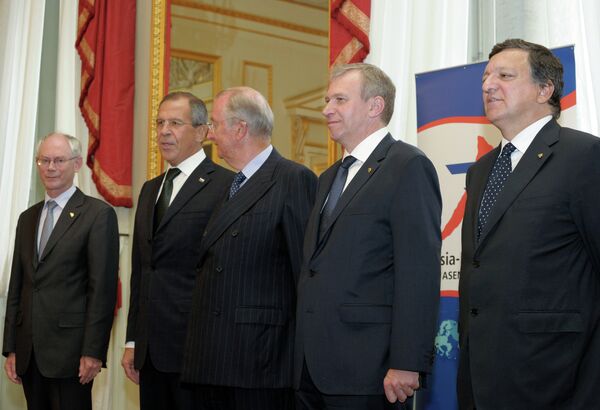Russia's debut at the Asia-Europe Meeting's (ASEM) latest session in Brussels was understated but elegant. President of the European Council Herman van Rompuy welcomed the three newcomers - Russia, Australia and New Zealand - and Russian Foreign Minister Sergei Lavrov gave a short speech.
With this latest addition, ASEM now has 48 members. ASEM is essentially a conference where participants can exchange views as equals. We live in an age of conferences and forums, which have become more frequent and numerous since the global financial crisis struck in September 2008.
Before the crisis, it seemed as though there was nothing left to discuss. Globalization was the new reality, and we all simply had to accept it, whatever reservations we might have about its alleged universal benefits. But now everyone is talking and trying to find mutually acceptable solutions. This was precisely the case at the latest ASEM forum in Brussels.
Russia's membership in the Asia-Europe Meeting has prompted Russians to once again ask themselves which continent the country actually belongs to. There is no definitive answer to that question, which partly explains why it took Russia several years to gain membership in ASEM. It initially applied as a European country, but the ASEM governing body rejected that first application on the grounds that only EU member states and nations in line for EU membership can be regarded as part of Europe proper. Moscow then submitted another application as an Asian country. Classifying Russia as an Asian country is debatable form a geographical standpoint. Also, some unambiguously Asian states refused to recognize Russia as one of their own on political grounds.
But as soon as ASEM decided it was in their benefit to have Russia as a member, the group came up with a clever solution, placing Russians in the same "Asian Europeans" category as Australians.
Of course, Lavrov could have made a high-flown speech about how Russians are just Asians with European features, or Europeans with an Asian soul. But he chose to speak on more mundane issues. Similarly, his Australian counterpart could have told the gathering about how the political pendulum has swayed over the years between those who consider Australia a stronghold of Western civilization in a hostile Asia and those who see the country's position on the edge of the vibrant Asian world as a blessing. But he also kept it simple.
And they were right to do so, because the ideological confrontation between Asia and Europe is no longer of interest these days. ASEM was founded in 1996 as an attempt on the part of the Europeans to make up for their absence in APEC. This forum owes its existence to Europe's growing concern that it could eventually be marginalized by a rapidly developing Asia. Back in the 1990s, though, Europe continued its stubborn attempt to school Asian countries in European ways. This was detrimental to Europe, although they may not have realized it yet.
The last ASEM forum was held in Beijing in 2008. With the financial crisis gaining momentum, the future looked bleak, and so all the European participants turned to the Chinese looking for cash. There was no time for ideological bickering. The Western delegates' desperate pleas for bailouts and the host's response laid the foundation for other, more serious meetings, like G20 summits, which actually make concrete decisions.
The final documents of the Brussels forum (particularly the statement of its chair) suggest that the participants have been working toward consensus all along and that they have been able to meet each other halfway on certain issues. The agenda in Brussels focused on major global issues, but problems specific to the Asia-Europe relationship were also addressed.
Judging from its latest discussions and statements, ASEM believes that cooperation between Europe and Asia is a source of stable growth and a way to redress the imbalances in the world's economic system today. It is now pushing for some Asian anti-crisis methods, developed in 1997, to be applied globally.
ASEM has reemphasized the need for innovation and industrial modernization, primarily through the introduction of energy-saving technology. It has called for the removal of unnecessary barriers to international freight shipments and noted that Russia had an important role to play in this process. And it has hailed labor migration as a source for positive new opportunities and a way to further develop the countries that are attracting foreign workers.
Russia's contribution to ASEM has so far been limited to proposals for cooperation in areas such as counter-terrorism, security, emergency management and disaster relief. But the list may grow over time to include other, less conventional, but no less important domains once Moscow realizes where the future of global development lies - something the West realized long ago.
The opinions expressed in this article are the author's and do not necessarily represent those of RIA Novosti.



